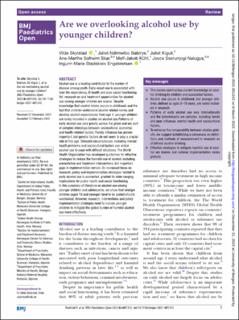Are we overlooking alcohol use by younger children?
Skylstad, Vilde; Babirye, Juliet Ndimwibo; Kiguli, Juliet; Skar, Ane-Marthe Solheim; Kühl, Melf-Jakob; Nalugya, Joyce Sserunjogi; Engebretsen, Ingunn Marie Stadskleiv
Journal article, Peer reviewed
Published version

Åpne
Permanent lenke
https://hdl.handle.net/11250/3039622Utgivelsesdato
2022Metadata
Vis full innførselSamlinger
Sammendrag
Alcohol use is a leading contributor to the burden of disease among youth. Early-onset use is associated with later life dependency, ill health and poor social functioning. Yet, research on and treatment opportunities for alcohol use among younger children are scarce. Despite knowledge that alcohol intake occurs in childhood, and the fact that children understand alcohol related norms and develop alcohol expectancies from age 4, younger children are rarely included in studies on alcohol use.Patterns of early alcohol use vary greatly across the globe and are part of complex interplays between sociocultural, economic and health-related factors. Family influence has proven important, but genetic factors do not seem to play a crucial role at this age. Stressful circumstances, including mental health problems and sociocultural factors can entice alcohol use to cope with difficult situations. The World Health Organization has developed guidelines for effective strategies to reduce the harmful use of alcohol, including preventative and treatment interventions, but important gaps in implementation remain. An increased focus on research, policy and implementation strategies related to early alcohol use is warranted, granted its wide-ranging implications for public health and social functioning. In this summary of literature on alcohol use among younger children and adolescents, we show that younger children (aged 10 and younger) tend to be systematically overlooked. However, research, interventions and policy implementation strategies need to include younger children to mitigate the global burden of harmful alcohol use more effectively.
